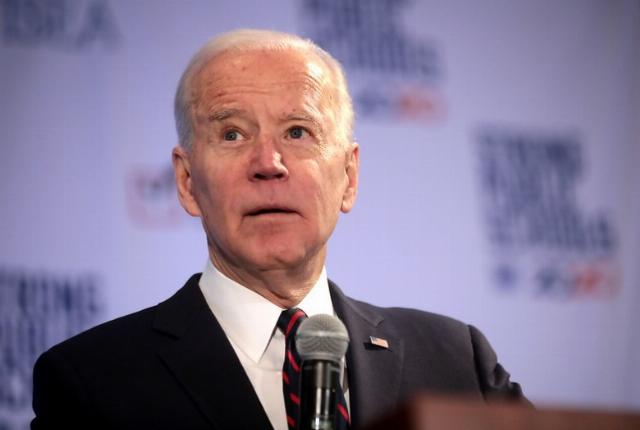Biden's mental decline reflected in foolhardy policies
Democrats are coming out in droves to urge President Biden to end his re-election bid, as his mental decline has become undeniable. Democrat politicians and progressive media members have been publicly demanding an alternative to Biden, and even actor George Clooney, who recently held a fundraiser for Biden, just published an op-ed in the New York Times, arguing that the Democrat Party needs a different nominee.
While Biden’s ability -- or lack thereof -- to carry out the physical duties of the presidency has captivated everyone’s attention, his recent, vocal support for an utterly destructive policy has flown under the radar. As of now, Biden is the Democrat nominee, and there is a chance he will participate in another presidential debate. Thus, we have a duty to continue scrutinizing his policy proposals.
During the previous presidential debate, Biden declared, “we’re going to make sure that we reduce the price of housing. We’re going to make sure we build 2 million new units. We’re going to make sure we cap rents, so corporate greed can’t take over,”
Biden’s focus on so-called corporate greed and support for caps on rent illustrate a dangerous misunderstanding of economic principles, risking counterproductive interventions in the housing market. His stance also shows a disregard for individuals’ right to employ their own property in the ways they see fit, violating their freedoms and harming prosperity.
In recent years, the corporate-greed line has become trite as a number of prominent Democrats have tried to blame inflation on corporate avarice. Not only has this supposed explanation for elevated prices been repeated ad nauseam, it is also inaccurate. The so-called greed of profit-maximizing entities is no greater when prices are high than when prices are low. Greed does not fluctuate with or determine prices; supply and demand do.
And any politician who grasps a few basic economic principles knows that capping rents leads to a shortage of housing and harms renters. While that seems counterintuitive, it’s true. High prices signal that demand is oustripping supply, which incentivizes developers and investors to create more housing in attempts to capture a slice of the potential profits. As more housing is developed and supply increases relative to demand, then prices moderate. By capping rents, the government distorts the signal that would otherwise tell developers to build more housing. Instead of new developments coming online, current landlords will cease providing upkeep services to the same extent since it will become unprofitable at capped rents, and others will transform their buildings into office spaces, luxury apartments, or other entities typically exempt from rent control. The result is a shortage of housing and higher prices in the long run.
This is not just theory. It has played out time and time again.
Ever wonder why rent is so high in some areas? Because there isn’t enough housing! Rent control would make the root problem worse. And Biden’s plan to build more government-funded housing merely redistributes taxpayer dollars through inefficient bureaucracies. If prices were allowed to fluctuate properly, and developers were not unduly restricted by city governments, then the private market could far more efficiently create the housing demanded.
Another issue with Biden’s proposed plan is that it wholly disregards the right of property owners to use their resources how they see fit. The government should not stand behind the point of a gun, so to speak, in an attempt to mandate how individuals price their own property. Such an edict, in effect, steals from landlords as it caps the profits they might make in a free market or puts them in the red altogether. Capping rents is not only counterproductive, but it is also coercive as it aims to control how people use their own property. This is an immoral practice that reduces happiness and prosperity throughout society.
While Biden’s mental decline is deeply concerning, his administration’s apparent lack of mastery -- or outright rejection -- of the most basic economic principles should concern us even more.
Benjamin Ayanian is a contributor and Human Respect Fellow for Young Voices. He is also the author of Beyond Intention: How Progressive Economic Policy Initiatives Would Harm Society’s Most Vulnerable. Follow him on Twitter @BenjaminAyanian.

Image: Gage Skidmore
FOLLOW US ON
Recent Articles
- Deep Dive: The Signal Chat Leak
- Mark Steyn’s Reversal of Fortune
- Where We Need Musk’s Chainsaw the Most
- Trump Is Not Destroying the Constitution, but Restoring It
- The Midwest Twilight Zone and the Death of Common Sense
- Hijacked Jurisdiction: How District Courts Are Blocking Immigration Enforcement
- Transgender Armageddon: The Zizian Murder Spree
- Jasmine Crockett, Queen of Ghettospeak
- The Racial Content of Advertising
- Why Liberal Judges Have a Lot to Answer For
Blog Posts
- April 2nd: Liberation Day and Reconciliation Day don’t mix
- Red crayons and hospital gowns
- The Paris Climate Agreement was doomed from the start
- Well excuse me, I don't remember
- Bill Maher goes civil
- Snow White: a bomb for the ages
- Rep. Elise Stefanik takes one for the team
- Two new revelations about the Signal leak, along with two theories
- Big Tech’s Invisible Hand: How Google and Meta manipulate our elections
- New report: Netherlands is now euthanizing minors
- Tantalizing tidbits: Five news stories about leftists, and sea lions, acting aggressively
- Rockets to Roses: Israel’s bizarre trade cycle with Aza
- Fort Knox? Gold cams!
- There is no birthright citizenship for illegal aliens
- Turn off the phone. Close the laptop.






